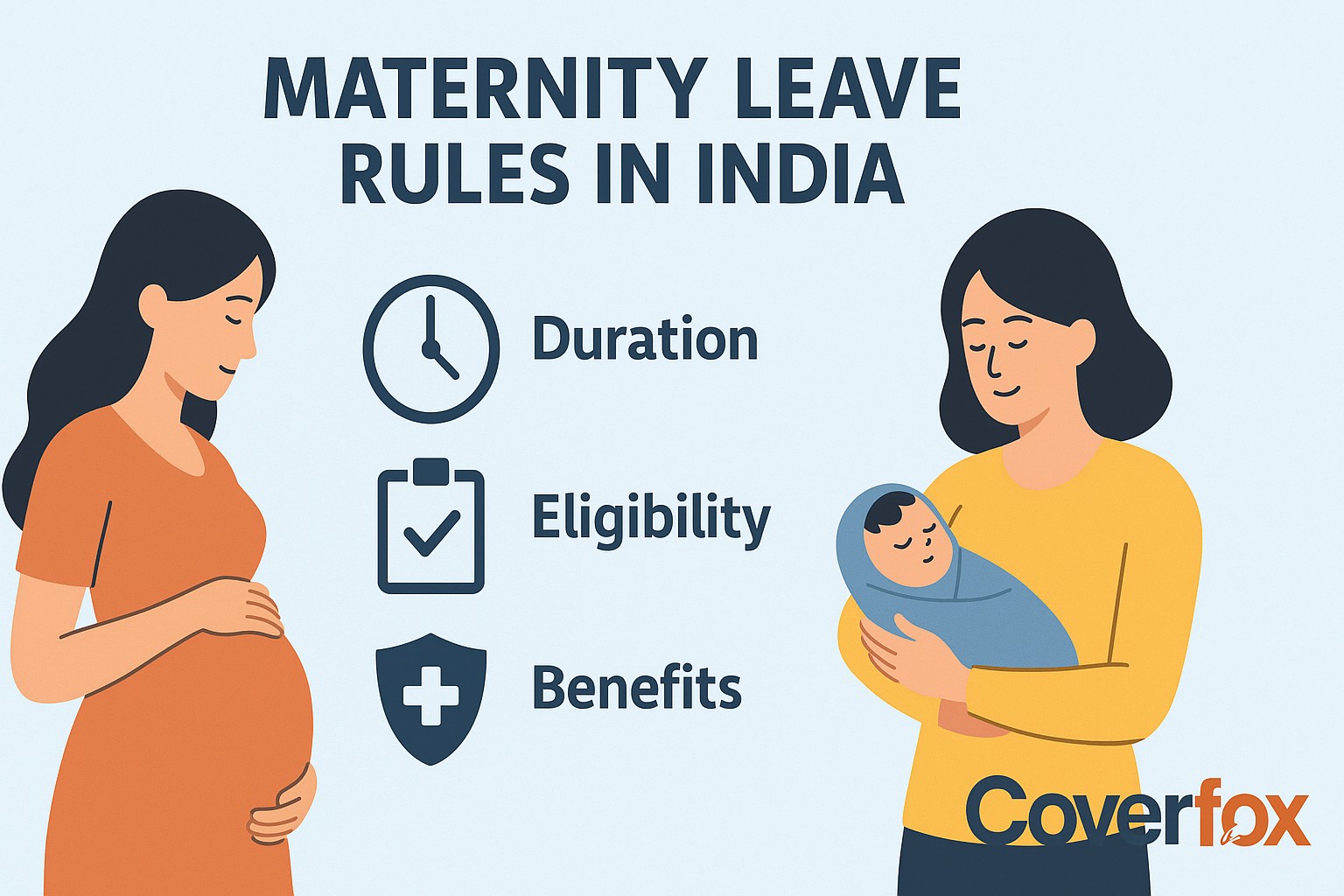Juggling work and focusing on motherhood is no easy task, especially for pregnant women who are soon to be due. This is where maternity leave steps in, which is the paid leave provided to pregnant women working in any organisation.

It helps understand the physiological and emotional demands placed on expectant and new mothers, allowing them the necessary support and time to recover from childbirth, bond with their newborns, and adjust to their new roles as mothers. In recent years, maternity leave in India has undergone significant changes, providing better protection and benefits for working mothers.
Check out the guide below to understand what maternity leave is and the various maternity leave rules in India - including eligibility criteria, challenges, updates, and other essential aspects.
Understanding the Maternity Leave Policy in India
The Maternity Benefit Act of 1961 provides comprehensive maternity benefits to help support working women during the birth of their child. It includes benefits such as medical bonuses, paid leave and nursing breaks. This Act clearly states the following:
- Women working for recognised organisations and factories can take maternity leave for up to six months.
- There is flexibility to take this leave either before or after childbirth, or it can also extend across both periods.
- Employers are required to pay the full salary to their women employees during this leave period.
Also Read: Know All About Maternity Insurance & Popular Maternity Insurance Plans
Updates to Maternity Leave Rules in India
The Maternity Benefit Act 1961 was amended in 2017. The following changes were incorporated into the Act:
| Amended Feature | Description |
|---|---|
| Increase in Maternity Leave | Earlier, maternity leave was 12 weeks. Since 2017, it has been 26 weeks for women with up to two children. Women can start to leave 8 weeks before delivery and take the remaining 18 weeks after birth. For women with more than two children, maternity leave remains 12 weeks. |
| Leave for Adoptive and Commissioning Mothers | Women adopting a child under 3 months old, or commissioning mothers (biological mothers who use surrogacy), get 12 weeks of maternity leave starting from the day they receive the child. |
| Work-From-Home Option | After maternity leave, depending on the job, women can ask to work from home for a period agreed upon with their employer. Employers may also allow working from home during pregnancy if the job allows. |
| Creche Facilities | Companies with 50 or more employees must provide nearby childcare facilities. Mothers are allowed to visit the creche four times during work hours. |
Who Is Eligible for Maternity Leave in India?
After understanding what is maternity leave, it also becomes important to know who can be eligible to avail of this leave:
Employment Status
You need to be a woman working in a government or private company to get maternity leave. The Maternity Benefit Act applies to women working in places like factories, shops, mines, plantations, or any company that has at least 10 employees.
Minimum Work Duration
To get the full 26 weeks of maternity leave, you must have worked for your employer for at least 80 days in the 12 months before your expected delivery date. These 80 days can be added up over time and don’t have to be continuous.
Type of Pregnancy
Maternity leave applies to both natural pregnancies and adoption. For a natural pregnancy, you can take maternity leave up to three times during your job. For adoption, you can take maternity leave once.
Informing Your Employer
You must tell your employer in writing about your pregnancy and when you expect to deliver the baby. This should be done at least 10 weeks before your due date. Let your employer know that you want to take maternity leave.
Medical Proof
Your employer may ask for medical certificates as proof of your pregnancy and expected delivery date. Providing these certificates helps in smoothly approving your maternity leave.
Size of the Workplace
The Maternity Benefit Act applies to workplaces with 10 or more employees. If you work in a smaller company, check if your employer has any maternity leave policies, as the law may not apply.
Challenges Employers Face with Maternity Leave
When it comes to maternity or parental leave in India, employers have to deal with certain challenges. These include:
- Workflow productivity could be hindered
- Extra time and effort to recruit and train new employees
- Risk of employees not returning after leave
- Increased expenses associated with paid leave
Important Points to Consider During Maternity Leave
To understand maternity leave rules in India, here’s what you should know:
| Aspect | Description |
|---|---|
| Salary During Maternity Leave | Employers must pay the woman her full salary during maternity leave. This salary is calculated based on her actual wages, or daily pay, over the 3 months before starting maternity leave. |
| Protection from Employment Termination | Employers cannot fire a woman during her maternity leave. If they do, they can face fines up to ₹5,000 or imprisonment for one year, or both. |
| Post-Delivery Work Restrictions | Employers must not make a woman work for 6 weeks immediately after delivery or miscarriage to allow her recovery. |
| Job Security and Restoration | Upon returning from maternity leave, women must be reinstated to the same or an equivalent job position they held before leave. |
| Workplace Amenities for Pregnant Employees | Employers must provide hygienic restrooms, comfortable seating, and safe drinking water. Pregnant employees should not be given difficult tasks or long working hours from 10 weeks before delivery. |
| Additional Leave and Work-from-Home Options | Employers may offer extra leave or work-from-home arrangements if mutually agreed with the employee after maternity leave ends. |
| Pre-Delivery Leave | Women can take up to 8 weeks of leave before delivery, which counts towards the total 26 weeks of paid maternity leave. |
| Maternity Leave Duration Based on Number of Children | Women with up to two children get 26 weeks of paid leave; for the third child and later, the leave is 12 weeks. |
| Leave for Miscarriage | In case of miscarriage, a woman is entitled to 6 weeks of paid leave from the date of the miscarriage. |
| Incentives and Bonuses | Additional benefits include an incentive of ₹3,500 and a maternity bonus of ₹6,000 under the National Food Security Act (2013) for pregnant and breastfeeding women. |
| Private Sector Variability | Women working in private companies should confirm leave policies with their employers, as they may differ between organisations. |
How Can Health Insurance Support Pregnancy?
Those planning to start a family should opt for health insurance plans with maternity coverage. This can help cover prenatal care, delivery, and postnatal care, easing the financial burden on expecting mothers. IRDAI-approved platforms like Coverfox are useful to view a wide variety of maternity health insurance plans from renowned insurers and help compare their benefits. This allows you to select plans that are tailored to your needs and budget!
Read More On:Why is It Important to Have Maternity Insurance?
Conclusion
In all, maternity leave in India is an essential benefit to expectant working mothers, allowing them to prioritise health and recovery while taking care of their emotional and financial well-being. As per recent changes, these rules for maternity leave have been significantly updated to support working mothers through extended leave, inclusive benefits for adoptive and commissioning mothers, and workplace facilities.
To ease financial burden during the pre- and post-pregnancy period, it is also recommended to purchase a health insurance policy with maternity cover. Choose platforms like Coverfox, which makes this process considerably easier—thanks to instant quotes, immediate policy issuance, easy renewals, and hassle-free claims!
Disclaimer: This guide is for general informational purposes only and does not constitute legal or professional advice. Maternity leave rules may vary by employer, sector, or subsequent amendments to the law. Readers should consult official government notifications or legal experts for specific guidance.
FAQs on Maternity Leave Rules in India
Has Maternity Leave in India Been Extended to 9 Months?
No, maternity leave in India is for 26 weeks, which is 6.5 months. There is no official information regarding its extension.
Is Maternity Leave Paid or Unpaid in India?
During maternity leave in India, women are entitled to their full salary, which ensures financial support to women during their absence from work.
How Many Days of Maternity Leave Are Provided in India?
Since 2017, for women with up to two children, maternity leave in India has been 26 weeks, while for women with more than two children, this leave remains 12 weeks.
What Is the Process to Apply for Maternity Leave in India?
To apply for maternity leave in India, women employees need to give notice in writing to their employers, stating the date of absence clearly and submitting the necessary medical proof.
.webp)
 in Insurance.webp)



